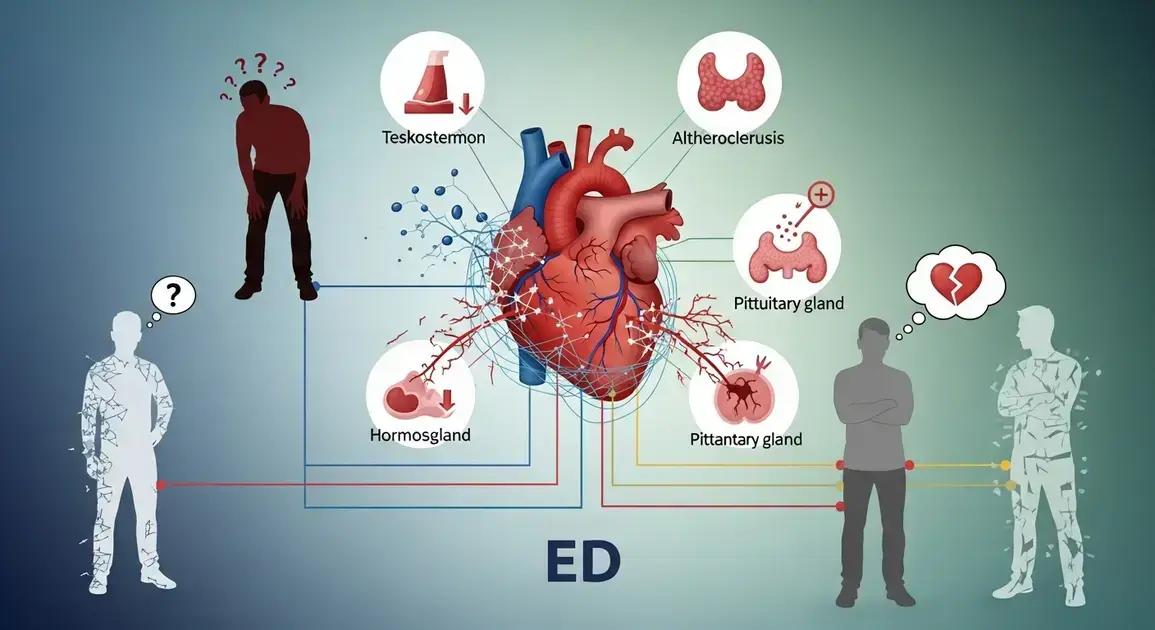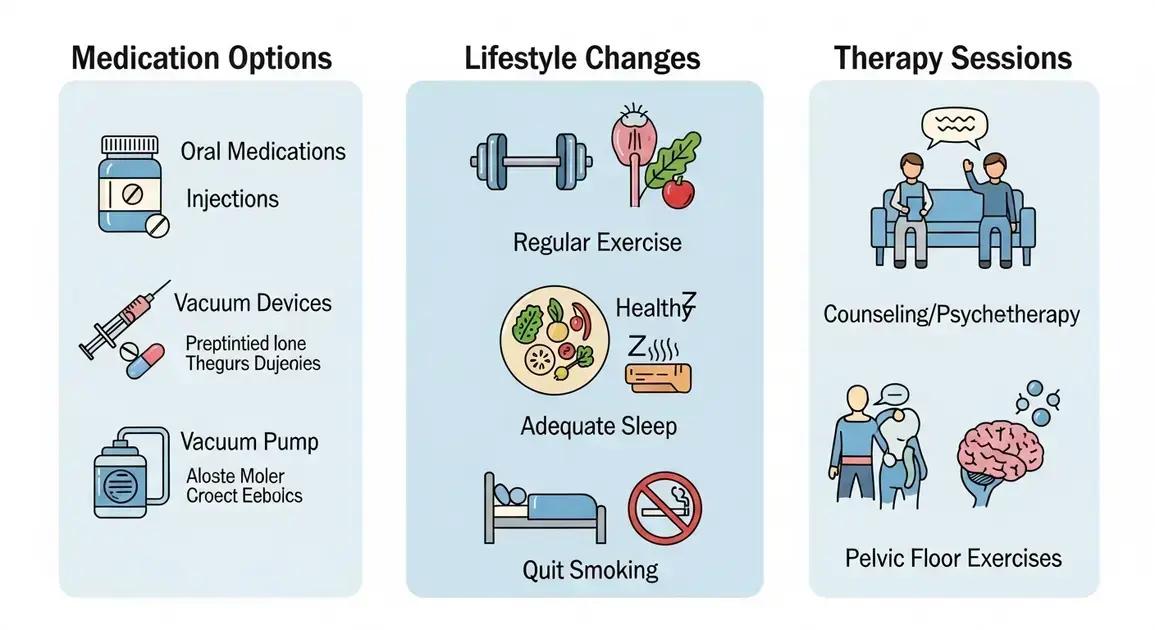Erectile dysfunction (ED) is a common condition characterized by difficulty achieving or maintaining an erection. It can result from various physical and psychological factors, including heart disease, diabetes, stress, and hormonal imbalances. Treatment options include medications, lifestyle changes, and counseling, all of which can significantly improve sexual health and performance.
Erectile Dysfunction Explained: What Every Man Needs to Know is essential for any man seeking to understand this common issue. ED can impact a man’s confidence and relationships, making it crucial to address. In this article, we’ll dive into the causes, symptoms, and effective treatments for erectile dysfunction. Let’s explore how lifestyle changes can also enhance performance and intimacy.
Understanding Erectile Dysfunction
Understanding Erectile Dysfunction is a vital part of male health. It refers to the inability to achieve or maintain an erection adequate for sexual performance. This condition can affect men of all ages, although it is more common in older individuals. Recognizing the signs of erectile dysfunction early can help in seeking timely treatment.
How Common is ED?
Statistics show that erectile dysfunction affects approximately 30 million men in the U.S. alone. It can significantly impact both emotional well-being and interpersonal relationships, making awareness and understanding even more important.
Physical and Psychological Factors
ED can arise from a combination of physical and psychological factors. Common physical causes include diabetes, heart disease, and obesity. Psychological factors may include stress, anxiety, or depression. In many cases, the condition stems from a combination of these elements.
Impact on Quality of Life
Living with erectile dysfunction can lead to lower self-esteem and increased anxiety, often causing distress in personal relationships. Men might feel embarrassed or less masculine due to their struggles, underscoring the need for open conversations about sexual health.
Importance of Seeking Help
Many men hesitate to discuss erectile dysfunction with their doctors due to fear or embarrassment. However, it’s crucial to address this condition openly, as it may serve as an indicator of underlying health issues. Early consultation can lead to effective treatment options.
Understanding erectile dysfunction is the first step toward regaining confidence and enjoying a fulfilling sexual life. As awareness grows, men are encouraged to seek help promptly and openly engage with healthcare professionals.
Causes of ED

Causes of ED can vary widely, and understanding them is crucial for effective treatment. Several factors can contribute to erectile dysfunction, both physical and psychological.
1. Physical Health Issues
Many medical conditions can lead to ED. Cardiovascular issues, such as high blood pressure and cholesterol, can restrict blood flow. Diabetes is another significant factor that can damage nerves and blood vessels needed for erections.
2. Hormonal Changes
Hormonal imbalances, particularly low testosterone levels, can also cause erectile dysfunction. Changes in hormone levels can occur due to aging, testicular injury, or certain medical conditions.
3. Neurological Disorders
Conditions such as Parkinson’s disease and multiple sclerosis can affect the nerves that communicate with the penis, leading to ED. These disorders disrupt the signals necessary for achieving an erection.
4. Psychological Factors
Stress, anxiety, and depression can all contribute to erectile dysfunction. Psychological challenges often create a cycle where anxiety about performance leads to further ED, making the situation more complex.
5. Lifestyle Choices
Unhealthy habits such as smoking, excessive alcohol consumption, and poor diet can severely impact erectile function. These factors can contribute to overall health decline, further worsening ED.
Addressing the causes of erectile dysfunction is essential for finding the right treatment and improving sexual health. Knowing the root causes can empower men to take the necessary steps for recovery.
Symptoms to Watch For
Symptoms to Watch For regarding erectile dysfunction (ED) can vary, but there are several key signs that men should be aware of. Recognizing these symptoms early can help in seeking appropriate help.
1. Difficulty Achieving an Erection
One of the most common symptoms of ED is trouble getting an erection when sexually aroused. This may happen frequently or only on occasion.
2. Trouble Maintaining an Erection
Even if a man can achieve an erection, he may have difficulty keeping it firm enough for sexual intercourse. This can lead to frustration and anxiety.
3. Reduced Sexual Desire
Many men with ED may experience a decrease in sexual desire. This symptom can create a cycle where the lack of interest in sex further exacerbates the issue.
4. Changes in Mood or Confidence
Men experiencing ED often report feeling anxious, depressed, or low in self-esteem. Emotional responses to ED can be just as significant as physical symptoms.
5. Related Physical Symptoms
In some cases, ED may accompany other physical symptoms. These could include changes in libido, delayed ejaculation, or a painful erection. It’s essential to discuss these symptoms with a healthcare provider.
Being aware of these symptoms is crucial for men. If any of these issues occur regularly, it is advisable to consult a healthcare professional for evaluation and guidance.
Treatment Options Available

Treatment Options Available for erectile dysfunction (ED) include a variety of methods tailored to individual needs. Understanding these options can guide men in choosing the best path for their condition.
1. Lifestyle Changes
Making healthy lifestyle changes is a great starting point. Regular exercise, a balanced diet, and quitting smoking can improve overall health, which often enhances erectile function.
2. Medication
Several medications are available that can help with ED. Phosphodiesterase type 5 (PDE5) inhibitors, like Viagra (sildenafil), Cialis (tadalafil), and Levitra (vardenafil), are commonly prescribed. These medications increase blood flow to the penis and help achieve an erection.
3. Vacuum Erection Devices
A vacuum erection device (VED) can also be useful. It consists of a plastic cylinder placed over the penis, creating a vacuum that increases blood flow. A rubber ring is then placed at the base of the penis to maintain the erection.
4. Hormonal Treatments
For men with hormonal imbalances, testosterone replacement therapy may be an option. This treatment can help restore hormonal levels, potentially improving sexual function.
5. Counseling or Therapy
Since psychological factors frequently contribute to ED, counseling or therapy can be beneficial. Speaking with a mental health professional can help address anxiety, stress, or relationship issues that affect performance.
These treatment options can vary based on individual conditions and symptoms. Consulting with a healthcare provider is essential for selecting the most effective treatment plan.
Lifestyle Changes for Better Performance
Lifestyle Changes for Better Performance can greatly improve sexual health and reduce the risk of erectile dysfunction (ED). Implementing these changes can lead to better overall well-being.
1. Regular Exercise
Engaging in regular physical activity is one of the most effective ways to enhance performance. Exercise improves blood circulation, boosts energy levels, and helps maintain a healthy weight. Aim for at least 30 minutes of moderate exercise most days of the week.
2. Healthy Eating
A balanced diet plays a crucial role in sexual health. Consume plenty of fruits, vegetables, whole grains, and lean proteins. Foods rich in antioxidants, such as berries and nuts, can improve blood flow and heart health.
3. Manage Weight
Maintaining a healthy weight is essential for preventing ED. Excess weight can lead to health issues like high blood pressure and diabetes, both of which can contribute to erectile dysfunction. If overweight, making gradual dietary changes and increasing physical activity can help.
4. Quit Smoking
Smoking adversely affects blood flow and damages blood vessels. Quitting smoking can significantly improve erectile function and overall health. Seek support if needed, as this can be a tough change.
5. Limit Alcohol Intake
While moderate alcohol consumption may not cause issues, excessive drinking can lead to sexual dysfunction. Limiting alcohol intake can improve sexual performance and overall health.
6. Manage Stress
Stress and anxiety can have a negative impact on sexual health. Incorporating relaxation techniques such as yoga, meditation, or deep-breathing exercises into your routine can help reduce stress levels.
Making these lifestyle changes can lead to significant improvements in both physical and sexual health. Taking small steps can result in meaningful changes over time.
In Conclusion: Navigating Erectile Dysfunction
Erectile dysfunction (ED) is a common issue that many men face at some point in their lives. Understanding the causes, recognizing the symptoms, and exploring treatment options can empower men to take charge of their sexual health.
Incorporating lifestyle changes such as regular exercise, a nutritious diet, and stress management can significantly improve performance and overall well-being.
It’s essential to consult with a healthcare provider for personalized advice and treatment plans. Addressing ED openly can lead to healthier relationships and a more fulfilling life.
By staying informed and proactive, men can navigate the challenges of erectile dysfunction and regain confidence in their sexual health.
FAQ – Frequently Asked Questions About Erectile Dysfunction
What is erectile dysfunction (ED)?
Erectile dysfunction (ED) is the inability to achieve or maintain an erection suitable for sexual intercourse.
What causes erectile dysfunction?
ED can be caused by physical issues like heart disease, diabetes, and hormonal imbalances, as well as psychological factors like stress and anxiety.
What are common symptoms of ED?
Common symptoms include difficulty achieving an erection, trouble maintaining an erection, and reduced sexual desire.
What treatment options are available for ED?
Treatment options include medications, vacuum erection devices, lifestyle changes, and counseling for psychological factors.
Can lifestyle changes help improve ED?
Yes, regular exercise, a healthy diet, quitting smoking, and managing stress can significantly improve sexual performance and overall health.
When should I see a doctor about ED?
If you experience symptoms of ED regularly, it’s important to consult a healthcare provider for evaluation and appropriate treatment.













